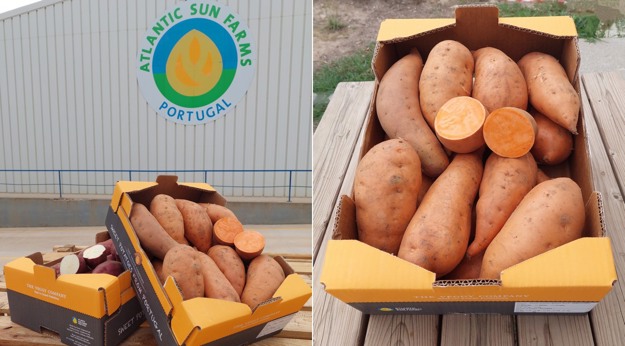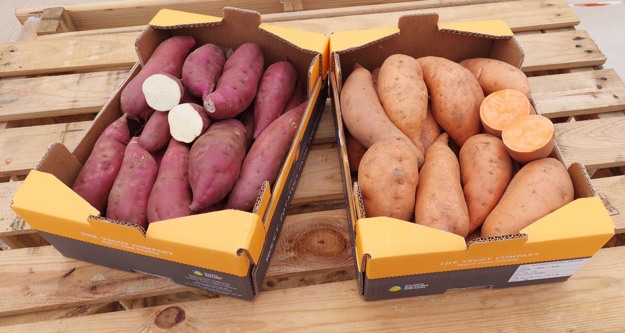Sweet potato production in Portugal has come a long way in the past nine years. According to Fernando Costa and Pat Fitzgerald from Nativaland the production is currently stable: “Sweet potato production in Portugal has stabilized as of late. This is partly due to the issues with water availability in the south. That being said, there’s always some fluctuation in the production of sweet potatoes on a yearly basis, and this year it’s expected that volumes will be slightly lower than they were last year. The quality of the sweet potatoes grown in Portugal has increased significantly the past nine years, and this year the quality will be up to par as well,” Costa explains.
Fitzgerald states that there are still parts of the process that Portugal can improve in to become more attractive for certain markets, such as storage, packaging and local branding of the product. “Portugal can still grow a lot at home and export, despite the stabilization of production volumes. However, currently Portuguese companies seem to have low interest and incentives in making investments in the process of storing and packing. It’s a missing part of the chain in Portugal. This was already the case in 2017 and honestly the situation hasn’t changed much, the same issues are present today and other sweet potato producing countries, such as the US and Egypt, are ahead of us in this specific part of the process. For the countries that buy our sweet potatoes, such as France, the Netherlands, Germany and the UK, it would be very interesting if we’re able to increase our capabilities when it comes to storing and packaging.”

Sweet potatoes from Atlantic Sun Farms, one of the companies that Nativaland works with
Variety protection is an important factor, Fitzgerald explains. Currently there is a large increase of Egyptian Bellevue, despite the fact that some of these growers do not hold the required licenses, and as such are not playing by the same rules as everyone else: “Looking at the current state of the international sweet potato market, the Egyptians are potentially flooding the market with illegal, or non-licensed sweet potatoes. Naturally, some of the Egyptian sweet potato growers and exporters have all their license in order, but many of them of them don’t, which affects the Portuguese sweet potato exports. Don’t get me wrong, I’m all for the Egyptians producing sweet potatoes and being able to supply year-round, I think it’s good for the industry. But they must be held to the same standards as European producers are.”
There is also the problem of varieties being mislabelled going into retailers from the supply chain, Fitzgerald emphasizes. “From Portugal, we are bringing in diverse sweet potato varieties to the market. When Egypt comes into the market with their non-licensed product, not held to the same standard, it will endanger our ability to improve the varieties, as we’ve worked with the University of Louisiana AgCenter to do a lot of research on the sweet potatoes. It also leads to unfair competitive prices." Costa states: "Sweet potatoes should be considered a horticultural product, and our varieties should be included in the protected variety list. We have personally confirmed that products are being mislabelled. For example we’ve seen Bellevue be labelled as Covington or Laranja sweet potatoes. This means the consumer can’t trust the label, which creates an issue on its own.”

Despite the missed opportunities when it comes to the post-harvest process, Fitzgerald and Costa both expect a positive sweet potato season for the Portuguese exporters: “Looking at the current season, the season started a bit earlier due to a warmer spring. This caused plants to evolve faster than they normally would. The quality of the sweet potatoes in Portugal is rather good this season and volumes are in line with expectations. When looking at the overall volumes for Europe, quantities might be slightly lower this year but we are seeing significant increase in Bellevue availability. The sizes and the skin are looking positive as well and storability has improved, but as I stated earlier, there’s still a lack of investments for storing, washing and packing of sweet potatoes. Portugal must step up to compete with other origins in this matter.”
For more information:
Fernando Costa
Nativa Land, Lda
Tel: +351 912988775
Email: [email protected]
https://nativaland.com/
